CSUN Helped Its Newest Graduates Realize Their Dreams
The captions are in Spanish and English.
A college education can be transformative. It can help a young woman fulfill dreams first imagined by her grandmother. It can provide an avenue for hope and opportunity for an asylum seeker fleeing oppression.
A college education can turn a student-athlete into a powerful advocate for others and help an immigrant from India build on the sacrifices of her parents to launch a research career in cognitive neuroscience.
More than 11,200 students are eligible to take part in California State University, Northridge’s commencement exercises this week. Each student has a personal story of hard work, perseverance and success. Below are examples of just some of these stories:
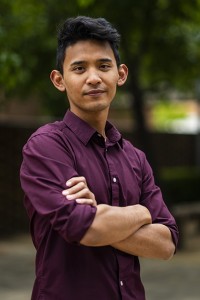
Nur Fahlevi Pratama
Nur Fahlevi Pratama, B.M. in Music Composition
For Nur Fahlevi Pratama, 28, of Sherman Oaks, there is no question that music is a universal language.
“There’s something about frequencies and sound waves, when combined, that creates a sense of harmony,” he said. “Music — beyond the visual arts, beyond text in books — allows us to feel emotions that cannot easily be described by words, Music, regardless of where it’s from, allows us to feel the in-between and sometimes feelings. We don’t have words for feelings like that, but music enables us to feel them just the same.”
Pratama said the music he is composing at the moment seems to be filled with “hope — hope for the future and for the opportunities ahead for me and so many others.” Something he wasn’t sure he had while growing up in Indonesia.
Western music, including classical music, is shunned by Indonesia’s conservative Muslim leaders, and Pratama, who taught himself to play the piano as a boy by watching videos on the internet, struggled to find an outlet for his passion.
His got his first glimpse of what was possible after the tragedy of 9/11, when he was part of a group of 80 teenagers from Muslim-majority countries sent to spend a year in the United States as part of a cultural exchange program. Pratama was sent to a high school in Humboldt County, a “very vibrant, very artistic, very diverse, very welcoming community,” he said.
There, he learned about life in the United States, about its freedoms and its rich and diverse music culture. A year after the exchange program ended, Pratama, who is gay, returned to Northern California and applied for asylum.
“I am a gay person, and being gay in Indonesia is simply not safe. I had to leave for my own safety,” he said, adding that “access to music education in Indonesia is a lot more difficult, especially as someone coming from a Muslim family — it was not acceptable for me to study Western music.”
Pratama spent about year in Humboldt County before moving to Southern California in search of a place where he “belonged.” He found his “community” as a member of the acclaimed Gay Men’s Chorus of Los Angeles and work as a gate attendant at Los Angeles International Airport.
“When I first came to the United States, I didn’t have the courage to actually pursue music as a career,” he said. “I knew it was something I was very passionate about. But, coming from Indonesia where music education and working professionally as a musician is very discouraged, I didn’t have the guts to really pursue music.”
He was driving to work one day, stuck in traffic, when he realized he didn’t want to do that for the rest of his life. With the support of friends in the chorus, he applied to study music composition at The Julliard School, a performing arts conservatory in New York City. He got in and spent three semesters at the school before the COVID-19 pandemic hit and interrupted his classes.
Determined to continue his music studies, Pratama returned to Los Angeles and enrolled at CSUN. He found a kindred spirit in music professor Liviu Marinescu, head of CSUN’s composition option, whose works have been performed around the world. Marinescu also is an immigrant for Romania.
“Dr. Marinescu’s experiences coming from a different country and different culture, really inspired me,” Pratama said. “We often talk, not just about music, but about our life experiences being from different places, how we adjust, how we’re not Americans and how all that affects our music. He makes me want to write more, and all my compositions recently have very much been about hope and belonging.”
Pratama will continue his music studies this fall at the Boston Conservatory, where he will be earning his master’s degree in conducting.
Pratama will be taking part in the Mike Curb College of Arts, Media, and Communication’s commencement ceremony at 6 p.m. on Monday, May 22.
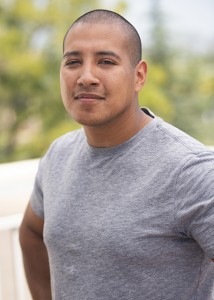
Marcos Rodriguez
Marcos Rodriguez, B.S. in Business Administration
Marcos Rodriguez, 23, of North Hollywood, was in the middle of Marine Corp infantry training when he flashed back to memories of struggling to complete assignments as a freshman in a CSUN business class.
“I was sitting in class, taking notes, listening to the professor in a classroom,” he said. “I was not sweating. I was not hurting, I was not hungry, I was not sleepy. I had a good eight hours of sleep. I finally appreciated what I had left behind. At that point, I understood that the life that I had at CSUN was so easy. It took me joining the military — to starving, not sleeping, and nearly crying from exhaustion — to understand that. And it also made me realize that completing my degree was possible.”
Rodriguez’ journey to CSUN started with a high school fieldtrip to the campus.
“The idea was to get students interested in higher education,” he said. ‘They took us to UCLA first, but then we came to CSUN. I had driven past the campus with my parents, but I’d never actually been here. Once I got here, I didn’t care about UCLA or UC Irvine. There was something about the environment, seeing people similar to me getting an education, that spoke to me. I knew this was where I wanted to go.”
The only thing standing in his way were his grades. A high school dean told him he might have a chance of getting admitted through the Educational Opportunity Program (EOP) but he would have to attend Saturday classes and summer school. Recalling a challenge by some Marine recruiters who doubted he had what it took to succeed, Rodriguez decided to prove them wrong. He made it into CSUN.
His first semester, Rodriguez, who was 17 at the time, struggled to make friends and was overwhelmed by his coursework. Worried that he had made the wrong choice, he sought out those recruiters to see if they might have a place for him. They told him about the Marine Corps Reserve, which would allow him to continue his education while serving his country. When he turned 18, Rodriguez signed up despite his parents’ objections.
His parents are undocumented immigrants from Mexico and their only experience with the military was as corrupt enforcers for an unjust government, he said.
“They came from a country where the government wasn’t good to them,” he said. “I understood where they were coming from, but I knew that the military was right for me.”
With help from CSUN’s Veterans Resource Center, Rodriguez was able to suspend his enrollment at the university for about a year while he took part in basic and other training.
At first, Rodriguez wasn’t sure if he was going to return to CSUN or make the military his career. But infantry training — which included long, physically demanding days with little food or sleep in adverse conditions — reminded him why he enrolled at the university in the first place and put the demands of getting higher education in perspective.
“Once I came back to school after my full year of training and was in a classroom again — with the air conditioning on, a good night’s sleep and good food in my tummy — I understood that student life isn’t that hard, it’s actually pretty good,” he said. “Sure, you get some hard assignments here and there, but the only thing that is struggling is your brain, nothing physical. The military was fun, but school was definitely the way to go.”
Rodriquez hopes to eventually have his own real estate company but, in the meantime, he has taken a full-time human relations position in healthcare, and he has a year remaining in his commitment with the Marine Corp Reserve.
He will be taking part in the David Nazarian College of Business and Economics’ commencement ceremony at 8 a.m. on Monday, May 22.
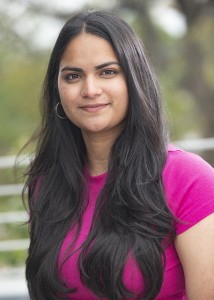
Sanjiti Sharma
Sanjiti Sharma, B.A. in Biology, with a minor in Psychology
When the COVID-19 pandemic hit, Sanjiti Sharma wondered about the toll spending countless hours staring into a computer screen for classes and meetings was taking on her, her classmates and her professors. She turned her questions into a research project and presented her findings — “Lights, camera, fatigue? Exploring the relationship of Zoom fatigue and videoconferencing camera usage and social pressure” — last semester at the Society of Neuroscience’s international conference in San Diego.
The study found that while videoconferencing does impact people socially, the camera had no effect on Zoom fatigue.
“We found that people who were more socially present while they were video conferencing experienced Zoom fatigue less,” Sharma said, adding that social mindfulness was key to mitigating the exhaustion caused by spending hours in front of a computer screen for meetings. “Even if you spend just five minutes sitting silently, meditating, just being mindful, you can increase your social presence and that will help you with those three-hour Zoom meetings.”
Sharma’s research and fascination with how the human brain works has earned her a spot at Colorado State University’s doctoral program in cognitive neuroscience.
Sharma, 22, said she would not have achieved what she has so far without the support of the faculty and staff at CSUN and her parents, who moved the family to Los Angeles from India when she was 16.
“My parents wanted endless academic opportunities for me and my younger brother, opportunities that weren’t possible for us in India,” she said.
Sharma said her first couple years in the United States weren’t easy.
“I ran into a lot of walls, jokes being made about the way I spoke or the way I acted because it was so different,” she said. “But I am a learner, and I loved learning about the culture and the way that people really lived their lives here. Learning was something that I had to utilize to acclimate to being here.”
When she arrived at CSUN, she said, “I saw a strong community of people like me here, people who were immigrants, people who came from different cultural backgrounds and people who came from families like mine — new to America — and maybe needed some financial help while they were going to college.
“I think that’s one of the big reasons I chose CSUN as my college,” Sharma said.
Her experiences at CSUN — whether in the classroom, doing research or working in the administrative offices of the University Student Union — influenced her dream to become a college professor who does research and who also serves as a mentor and advocate for her students.
“I enjoy teaching, talking to people and showing them my research or just talking to them about the new things I learn,” Sharma said. “At the same time, a lot of people have been there for me, supported me, advocated for me. I want to be in a position where I can pay that back by doing the same for students like me.”
Sharma will receive her degree during the commencement ceremony at 6 p.m. on Friday, May 19, for graduates of the College of Engineering and Computer Science and the College of Science and Mathematics.
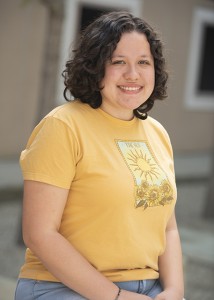
Anjelique Soto
Anjelique Soto, B.A. in Deaf Studies, with a minor in American Indian Studies
When Anjelique Soto walks across the commencement stage in front of CSUN’s University Library on May 20, she will not only be celebrating the culmination of her undergraduate studies, but the fulfillment of dreams first imagined by her grandmother. She will also be demonstrating to her 9-year-old son Kayson Bothwell that anything is possible if you are willing to work for it.
“Kayson is the reason I get out of bed every day,” Soto said. “He’s the reason why I studied and why I knew I was going to do this. I don’t think I would have accomplished all that I have if it wasn’t for him. I knew I needed to do this for me, and for him. I had to keep going if I wanted to make his life better and give him opportunities I didn’t have.”
Soto, 28, grew up in Oxnard, said she was heavily influenced by her mother Tami Garcia and grandmother Polly Franco, who were determined to see that she took advantages of opportunities they could not.
“My grandmother is the reason I even considered going to college,” Soto said. “She had my mom when she was 16 and she never had a chance to go to college, even though she wanted to. And my mom had me when she was young. Ever since I was little, my grandmother would tell me, “Go to school. Go to college. It’s important that you keep going.’”
Upon graduating from high school, Soto enrolled at Oxnard Community College as an English major. Then she found out that she was pregnant. Determined to get a college education, she stayed in school with the support of her son’s father and her family.
The birth of her son and the fact that she changed her major to American Sign Language (ASL) — “I realized English was just not for me,” she said — meant it took five years for Soto to complete her associate degree. Next was CSUN, where she planned to get the bachelor’s degree in American Sign Language she needed to become an ASL interpreter. But first, she took two years off to deal with the separation from Kayson’s father.
“I knew I had to find independence,” she said. “I worked for those two years and saved money. When those two years were over, it was time to continue my education.”
Soto enrolled at CSUN, moved into family student housing and she and Kayson learned to navigate life on their own. Soto doesn’t drive and her family, her former support system, was a county away.
But she quickly discovered she really wasn’t alone. Classmates offered to take her grocery shopping, drive her to appointments and meetings, and watched Kayson when needed. Professors welcomed her son into their classrooms when childcare fell through.
“I was amazed at how supportive my classmates were,” she said. “They weren’t just there for me, they were there for Kayson, too.”
Soto plans to stay in the San Fernando Valley — working as an ASL interpreter and advocate for the Deaf community — so her son can remain at his elementary school.
After Kayson was born, Soto said finishing her college education didn’t seem within her realm of possibilities. She said she might have given up if not for her grandmother’s encouragement. She’s hoping her example will inspire her son.
“Kayson has grown up at CSUN,” she said. “He’s sat in on classes. He knows this campus probably as well as any student. His favorite place is the campus coffee shop, the Freudian Sip. He knows that college is not something out of reach. He knows it’s a place he belongs.”
Soto will receive her degree during the commencement ceremony at 6 p.m. on Saturday, May 20, for the graduates from the Michael D. Eisner College of Education and the graduates of the Departments of Political Science, Public Administration, Public Sector Management, Psychology and Social Work in the College of Social and Behavioral Sciences.
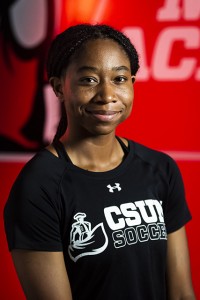
Taylor Thames
Taylor Thames, B.A. in Africana Studies and a B.A. in Sociology
Growing up, Taylor Thames, 22, of San Gabriel, had always been fast. Adopted out of foster care, her parents looked for ways to turn that speed into something that could help her find a sense of purpose and belonging. She found them on a soccer field.
“It was a chance to express my personality and have fun,” said Thames, who played goalie for CSUN’s women’s soccer team and competed in both the 100m and 200m as a member of the university’s track and field team.
In elementary school and high school, teachers would tell Thames’ parents that she was smart and had the capability to be “a great student,” but she did her schoolwork so fast that it was filled with errors.
“I was always the first to finish, and because I was working so fast, I made simple mistakes,” she said. “My dad told me, ‘It’s not a race, it’s not a competition.’ The problem was, I was constantly competing, wanting to be first, that I was kind of missing the finer details. It wasn’t until I got to college that I learned to slow down. It gave me an opportunity to engage with the curriculum and my education and find things that truly interested me. I didn’t just speed through it anymore.”
Thames’ prowess on the track and soccer fields in high school drew the attention of several college recruiters, but they wanted to her choose only one sport to compete in.
“CSUN’s coach Keith West told me ‘You can do both and we’ll support you in any way possible,’” she said. “I knew CSUN was the place for me.”
Thames admitted that when she first got to campus, “I wasn’t really here for an education.”
“I was glad I got in, but I was really here for track and soccer,” she said. “Coach West helped me understand how important my education would be and what a powerful tool it could be for me and my future. It was the first time someone outside my parents made an effort to believe in me and what I could do outside of anything athletic.”
Thames was initially a marketing major. But as much as she enjoyed the subject, she wanted to do something that would have more impact on people’s lives and on society. So, she switched her major to sociology.
As she made her way through academic requirements, Thames started taking classes Africana studies. Having grown up in San Gabriel with a population that is mostly Asian and white, she said she was eager to learn more about her own history and culture. She began doing research on the intersectionality of culture and race, and how micro interactions can influence macro structures. Her most current research project focuses on Black cinematography and its influence on cognitive behavior in the Black psyche.
“Growing up, I was constantly having to navigate at a school that didn’t have a lot of people that looked like me, whether students or teachers,” she said. “I constantly got questions about whether I lived in the area, was I getting bused in or was I brought in the athletic success for whatever school I was attending.
“When I stepped on to CSUN’s campus, it felt like I was home,” she said. “It was inspiring to see tangible proof that what I have experienced in my primary years was not the world itself. Sometimes, we’re limited by what we see and encounter every day. To see and experience a place that had a larger population of Black students and to see Black professors helped me to understand that as I continue to branch out and find my place in the world, I will encounter communities where I will be embraced and have shared experiences.”
In addition to her time on the field and in the classroom, Thames, as a member of CSUN’s Dubois-Hammer Institute for Academic Achievement, also provided academic support to her fellow-student athletes at the Matador Achievement Center. She will remain at CSUN in the fall to earn a master’s degree in leadership. She hopes to one day work at the college and professional sport level on increasing diversity and promoting player welfare.
Thames will receive her degrees during the commencement ceremony at 8 a.m. on Saturday, May 20, for the graduates from the Departments of Africana Studies, Anthropology, Criminology and Justice Studies, Geography, History, Sociology, and Urban Studies and Planning in the College of Social and Behavioral Sciences.

 experience
experience